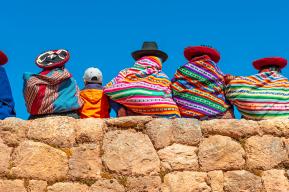News
How can Latin American and Caribbean indigenous languages be preserved?

Indigenous languages are an irreplaceable legacy for humankind, and these cultural contributions are an extremely rich heritage for society. They convey a plural, rich, diverse, heterogeneous, and ancient story. Unfortunately, more than 40% of the approximately 6,700 indigenous languages currently spoken in the world are endangered. If they disappear, a unique piece of humankind's history would be lost.
Given such pressing circumstances, the United Nations declared the 2022 to 2032 period as the International Decade of Indigenous Languages to draw the world's attention to the critical loss of indigenous languages and the urgent need to preserve, revitalize and promote them, and to take immediate national and international measures to protect them.
The UN has designated UNESCO as the lead agency to carry out the preparations of the International Decade at the global level. To prepare an efficient Action Plan to protect these languages during the International Decade, UNESCO is organizing a Regional Consultation for Latin America and the Caribbean to identify the regional priorities to safeguard the indigenous languages in the region.
This initiative aims to bring together a diverse range of actors, including national government representatives, indigenous peoples, social organizations, scholars, and experts in the field of indigenous languages, to advance strategies and partnerships to promote and protect indigenous languages in Latin American and the Caribbean countries.
A multidisciplinary approach will seek to identify regional priorities, including strategic objectives, results, areas for change, and regional flagship and pilot projects for the International Decade in Latin America and the Caribbean. The primary purpose of the consultation is to raise awareness about the relevance of indigenous languages, linguistic diversity, and multilingualism for sustainable development. Also, it will seek to forge partnerships and build alliances among several stakeholders to establish a regional network of collaborators, national committees, and focal points for the International Decade in Latin America and the Caribbean.
Generally speaking, the loss of indigenous language results from the forced relocation, assimilation, economic migration, illiteracy, poverty, exclusion, discrimination, and human rights violations of the communities that speak it. It is believed that modern times and globalization have accelerated their extinction and the use of dominant languages increasingly marginalizes those of the minorities.
You can follow the event on UNESCO Montevideo YouTube Channel .
- Thursday, May 27th, 2021, at 4:00 p.m., Argentina and Uruguay time (GMT-3).
- Friday, May 28th, 2021, at 11:00 a.m., Argentina and Uruguay time (GMT-3).
See the agenda of the event here
Sepa más
- 2019 International Year of Indigenous Languages
- The UNESCO Courier - 2019 International Year of Indigenous Languages
- UNESCO's consultations in LAC for the preparation of the Global Action Plan for the International Decade of Indigenous Languages
- Be a part of strategic planning
- The upcoming Decade of Indigenous Languages (2022 – 2032) to focus on Indigenous language users' human rights
- UNESCO launches the Global Task Force for Making a Decade of Action for Indigenous Languages




